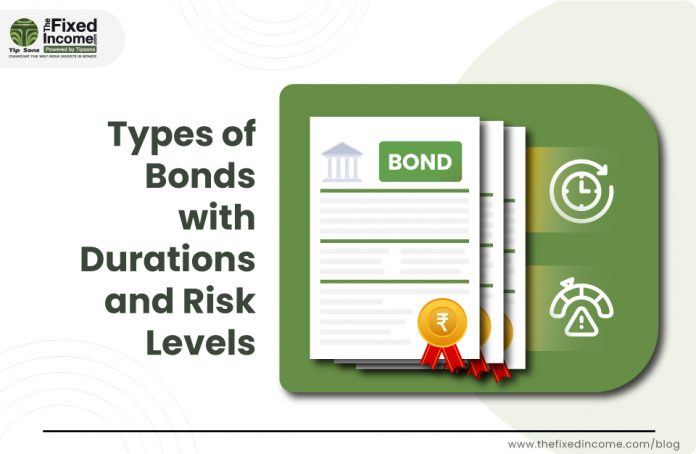In the realm of investments, bonds have always been a popular choice among investors, providing an avenue for safe returns. India, being a rapidly developing economy, offers various types of bonds to cater to the diverse needs of investors.
This article is your guide to understanding India’s different types of bonds, their risk levels, and durations. So let’s dive in and explore what factors you should consider before investing in these bonds.
Introduction to Bonds
Have you ever wondered how governments, corporations, and other institutions raise funds for specific periods? Well, bonds are the answer! These debt instruments offer bondholders interest payments, known as coupons, at regular intervals and also assure repayment of the principal amount upon the bond’s maturity. In India, bonds are categorized based on various factors such as coupon rates, maturity periods, convertibility options, and risk levels.
Types of Bonds in India
Government Bonds
The central and state governments in India issue government bonds to fund public projects and regulate the country’s fiscal deficit. These bonds are highly regarded for their safety, as the government backs them. Additionally, they provide moderate returns and are generally long-term investment options.
● Treasury Bills (T-Bills)
– T-Bills are short-term debt instruments that RBI issues on behalf of the government.
– They have maturities ranging from 91 to 364 days and are issued at a discount to their face value.
– Investors can purchase T-Bills at a lower price than their actual value and receive the total face value upon maturity.
– The primary distinction between the purchase price and face value is the return on investment.
– T-Bills are considered a safe and reliable investment option backed by the Indian government.
● Government Securities (G-Secs)
– G-Secs are long-term bonds issued by the Indian government.
– They offer a fixed coupon rate with a maturity period of 5-30 years.
– G-Secs are considered low-risk investments and highest safety as the government backs them. They are also known as sovereign bonds or risk-free gilt-edged securities due to government backing.
– They are highly preferred by conservative or risk-averse investors seeking stable and predictable returns on their investments.
Corporate Bonds
Corporate bonds are a popular choice for those seeking to diversify their portfolio in finance and investment. Essentially, a corporate bond is a type of debt security that companies use to raise funds for business expansion, research and development, or other purposes.
Unlike government bonds, which offer lower returns but are considered more stable, corporate bonds offer a higher potential for returns but also come with increased risk levels due to the possibility of the issuing company defaulting on its debt.
Before making any investment decisions in the Indian market, it’s essential to understand the various types of bonds available. Each bond has its unique features and risk levels that require careful consideration.
● Fixed-Rate Bonds
– Fixed-rate bonds offer a consistent interest rate for the entire duration of the investment.
– Investors can expect predictable and guaranteed returns.
– It is ideal for those prioritizing stability and long-term income.
– Fixed interest rates protect against market fluctuations or economic uncertainties.
– Fixed-rate bonds provide a reliable source of income over time.
● Floating-Rate Bonds
– Bonds with floating interest rates have variable interest rates linked to a reference rate.
– They offer protection against changes in interest rates.
– They are a wise choice for investors who anticipate interest rates to increase in the future.
● Zero-Coupon Bonds
– Zero-coupon bonds don’t pay regular interest payments.
– They are sold at a discounted price compared to face value.
– They are redeemed at full face value upon maturity.
– The distinction between the purchase price and face value is the investor’s return.
– More suitable for long-term capital appreciation than regular income.
● Convertible Bonds
– Convertible bonds allow investors to convert their bonds into equity shares at a predetermined time.
● Callable Bonds
– Callable bonds allow the issuer to redeem them before maturity at a set price and date.
– They typically offer higher coupon rates to compensate for the increased risk of early redemption.
– Investors who are comfortable with this risk may find them to be a good investment option.
● Puttable Bonds
– Puttable bonds allow bondholders to sell their bonds back to the issuer before maturity
– Usually offer lower coupon rates
– More suitable for investors who require flexibility to withdraw their investment before maturity
Municipal Bonds
In India, municipal bonds, commonly called “muni bonds,” are issued by local governments and urban development authorities to raise funds for infrastructure projects and public services. The government has actively encouraged and recommended local entities to utilize bonds as a means to meet their funding needs.
Nevertheless, it’s important to note that municipal bonds could potentially carry a higher level of risk than government bonds since they are issued by municipalities or local authorities.
Inflation-Linked Bonds
Investors frequently encounter the daunting hurdle of inflation, which can substantially diminish the worth of their investments over an extended period. Fortunately, there is a viable solution to mitigate this risk in the form of inflation-linked bonds.
These bonds are specifically structured to safeguard investors against inflation by modifying the interest payments based on any fluctuations in the inflation rate.
Inflation-linked bonds are a dependable investment opportunity for those seeking to protect their purchasing power from the effects of inflation. These bonds provide a safe haven for investors against inflationary risks.
This makes inflation-linked bonds a wise choice for those looking for a reliable way to safeguard their investments.
Factors to Consider Before Investing in Bonds
Before investing in any type of bond, it is essential for investors in India to evaluate various factors thoroughly:
Investment Goals and Risk Tolerance
Before selecting a bond, it is crucial for investors to assess their investment objectives, the risk level they are willing to take, and their liquidity requirements. Those more cautious may find government or fixed-rate corporate bonds suitable, while those more inclined to take risks may consider high-yield or convertible bonds.
Credit Rating
Investors can use credit ratings from agencies like CRISIL, ICRA, and CARE to determine the creditworthiness of bond issuers. A higher rating means lower default risk, whereas a lower rating indicates higher risk.
Maturity and Duration
When deciding to invest in bonds, investors need to take into account the bond’s maturity and duration. This is because these factors can affect how susceptible the bond will be to interest rate changes. Typically, bonds with longer durations will be more sensitive to fluctuations in interest rates, while bonds with shorter durations will be less sensitive.
Liquidity
When investing in bonds, liquidity is significant because it affects how easily investors can buy or sell their bonds on the secondary market. As a result, bonds with higher trading volumes are typically more liquid than the ones that may have lower trading volumes.
Diversification
To minimize overall portfolio risk and increase returns, investing in a diverse range of bonds across various types, sectors, and maturities is recommended.
Conclusion
To summarise, India offers numerous types of bonds that cater to various investor preferences and needs. By comprehending each bond type’s characteristics, durations, and risks, investors can make informed choices and select the most fitting bonds to meet their investment goals.
The Fixed Income Difference
If you’re looking to invest in bonds, The Fixed Income is the place to go. Competent relationship managers offer unparalleled knowledge of types of bonds, durations, and risk levels, providing valuable insights to help investors make informed decisions.
So whether you’re fresh to investing or an experienced investor, The Fixed Income can guide you through the complex world of bond investing. Start Exploring Now!
Disclaimer: Investment in the securities market is subject to market risks, read all documents carefully before making an investment.
























